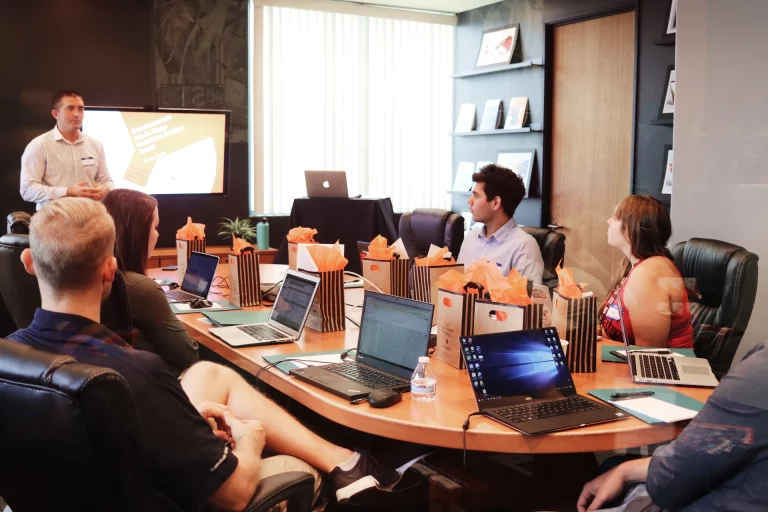Providing Support To Team Members
Fostering a successful and harmonious work environment relies heavily on team support, which plays a pivotal role in enhancing job satisfaction, boosting motivation, and improving overall team performance.
However, challenges may arise in balancing individual and team needs, resolving conflicts, and managing workloads. We will dig into the importance of team support, effective leadership and motivation strategies, common challenges faced, and ways to overcome them.
“Teamwork is the secret that makes common people achieve uncommon results.”–Ifeanyi Enoch Onuoha
Join us as we discover how to cultivate a supportive and thriving team environment, empowering both individuals and the team as a whole.

What is Team Support?
Team support involves providing assistance, guidance, and mentorship to team members to enhance collaboration and achieve shared goals effectively.
By offering ongoing assistance and coaching, team members can rely on each other’s strengths and collectively work towards success. A supportive team environment encourages open communication and problem-solving, leading to increased productivity and job satisfaction. Effective leadership plays a crucial role in fostering a culture of support within the team, where individuals feel valued and empowered to contribute their best.
With the right guidance and mentorship in place, team members are more likely to feel motivated and inspired to collaborate, driving innovation and success in their collective endeavors.
Importance of Team Support
Team support is crucial as it fosters development, encourages collaboration, and empowers team members to excel through effective communication and empathetic leadership.
By fostering a culture of support within a team, individuals feel valued and motivated to contribute their best efforts towards common goals. Empathy plays a vital role in understanding and addressing the needs and challenges faced by team members, creating a sense of belonging and trust. Motivation acts as a driving force that propels individuals to strive for excellence and continuously improve.
Effective communication not only ensures clarity in tasks and objectives but also promotes open dialogue, idea-sharing, and problem-solving, paving the way for a positive and empowering work environment.
Improves Team Performance
Enhancing team support significantly boosts productivity, drives success, nurtures a positive work environment, uplifts morale, and promotes skill development and career growth among team members.
When team members are supported by their colleagues, they are more likely to achieve individual and collective goals, leading to increased efficiency and output. One key example of team support improving productivity is seen in collaborative projects where team members share expertise, resources, and ideas to tackle challenges together, resulting in innovative solutions and faster project completion.
Team support plays a crucial role in boosting morale by fostering a sense of belonging and camaraderie. This positive work environment not only enhances job satisfaction but also encourages team members to take risks, learn from failures, and ultimately grow both personally and professionally.
Ultimately, team support nurtures a culture of continuous learning and development, contributing to overall team success and paving the way for career advancement opportunities.
Builds Trust and Communication
Establishing strong team support builds trust, fosters open communication, nurtures mutual respect, encourages recognition, and strengthens teamwork dynamics.
One effective communication strategy for enhancing teamwork dynamics is implementing regular team meetings where team members can openly share ideas, concerns, and feedback. This promotes a culture of transparency and inclusivity, allowing everyone to contribute to collective goals.
Recognizing individual and team achievements plays a crucial role in boosting morale and fostering a positive work environment. When team members feel valued and appreciated, they are more likely to actively engage in collaborative efforts, leading to a more cohesive and successful team.”
Check out the new Motivation Mentor AI Coach
app from Motivation Pay… It’s FREE!
Increases Motivation and Job Satisfaction
Providing robust team support amplifies motivation, enhances job satisfaction, offers encouragement, provides constructive feedback, and paves the way for career advancement opportunities within the team.
“Individual commitment to a group effort–that is what makes a teamwork, a company work, a society work, a civilization work.”–Vince Lombardi
This cohesive support system within a team plays a crucial role in boosting morale and fostering a positive work environment. When team members feel supported and valued, they are more likely to be engaged in their work, leading to increased productivity and quality of output.

The exchange of positive feedback and encouragement among team members not only bolsters individual confidence but also strengthens bonds, promoting collaboration and idea-sharing. The presence of growth opportunities within the team cultivates a sense of purpose and drives individuals towards achieving their career goals dynamically.
Ways to Provide Support To Team Members
Supporting team members involves various strategies, including offering training, necessary resources, encouragement, constructive feedback, and assistance in problem-solving. Additionally, acknowledging output, a tap on the back for a job well done, or even monetary rewards can further motivate individuals and reinforce their efforts.
By providing continuous learning opportunities, team members can enhance their skills and remain updated with industry trends. Implementing a robust feedback mechanism ensures that individuals receive guidance on their performance, allowing them to make necessary improvements.
Furthermore, offering flexibility in work schedules, such as telecommuting or flexible hours, can promote a healthy work-life balance, reducing burnout. Providing access to mental health resources and stress management techniques is also essential in maintaining a positive and productive work environment.
Communicate Effectively
Effective communication is foundational in establishing trust, fostering respect, encouraging recognition, strengthening teamwork, and cultivating empathy within the team support framework.
Clear and open communication channels play a pivotal role in ensuring that team members feel heard, valued, and understood. When team members can communicate effectively, they can share ideas, provide feedback constructively, and address any challenges or conflicts collaboratively.
Encouraging active listening and practicing empathy allows team members to connect on a deeper level, fostering a sense of unity and camaraderie. By incorporating regular team meetings, group brainstorming sessions, and individual check-ins, teams can create a supportive environment where everyone’s voice is heard and respected.
“Talent wins games, but teamwork and intelligence win championships.”–Michael Jordan
Be Available and Approachable
Being available and approachable fosters empowerment creates a supportive system, promotes active listening, nurtures rapport building, and enhances inclusivity within the team.
By maintaining an open-door policy and showing genuine interest in team members’ concerns, leaders can establish trust and build strong relationships. Encouraging dialogue and seeking feedback not only boosts team morale but also allows for collaborative problem-solving. Active listening, where team members feel heard and valued, paves the way for effective communication.

Inclusive practices like recognizing diverse perspectives and fostering a sense of belonging further strengthen the team’s cohesion and productivity.
Offer Encouragement and Recognition
Providing encouragement and recognition boosts morale, strengthens trust and respect, and creates a positive environment that fosters continuous growth and development.
When team members feel appreciated and acknowledged for their contributions, they are more likely to be motivated to excel in their roles. This sense of validation not only enhances individual performance but also promotes a collaborative spirit within the team. By fostering an environment where achievements are recognized and efforts are praised, team dynamics are positively influenced, leading to increased productivity and job satisfaction.
Such gestures of encouragement and recognition serve as building blocks for a cohesive team culture centered on support, positivity, and shared success.
Supporting team members with accessible resources and tailored training opportunities not only fosters a positive work environment but also empowers individuals to contribute effectively towards shared goals.
Provide Resources and Training
Offering resources and training programs promotes well-being, encourages knowledge sharing, facilitates goal setting, drives performance improvement, and enhances skill development among team members.
Supporting team members with accessible resources and tailored training opportunities not only fosters a positive work environment but also empowers individuals to contribute effectively towards shared goals. By encouraging continuous learning and skill enhancement, team members can stay updated with industry best practices and innovation, ultimately positioning the team for success in a competitive market.
Aligning individual goals with overarching team objectives strengthens collaboration, boosts morale, and elevates overall team performance, resulting in a cohesive and highly productive work environment.
Foster a Positive Team Culture
Creating a positive team culture nurtures career growth, fosters learning opportunities, strengthens interpersonal relationships, promotes emotional intelligence, and encourages adaptability among team members.
When team members feel supported and valued within their working environment, they are more likely to engage in continuous learning and professional development. Emotional intelligence plays a crucial role in team dynamics, as it enhances communication, empathy, and collaboration.

A culture that promotes adaptability enables team members to navigate challenges and changes effectively. Strong interpersonal relationships facilitate open communication, trust, and synergy within the team, leading to increased motivation and job satisfaction.
Common Challenges in Providing Support to Team Members
Despite the benefits, challenges in providing support to team members may include ensuring inclusivity, embracing diversity, promoting accountability, fostering commitment, enhancing understanding, and active listening.
A key challenge is the need to ensure that every team member feels valued and included, regardless of their background or perspectives. Embracing diversity involves recognizing and celebrating differences within the team.
Accountability can be promoted by setting clear expectations and responsibilities for each member. Fostering commitment requires creating a shared vision and aligning individual goals with the team’s objectives.
Understanding the unique strengths and challenges of team members is essential for effective collaboration. Practicing active listening involves being fully present and attentive when team members share their viewpoints.
When team members feel that their individual needs are acknowledged and respected, they are more likely to perform well collectively.
Balancing Individual and Team Needs
Balancing individual and team needs is key to maintaining morale, ensuring well-being, promoting work-life balance, and fostering trust, respect, and recognition within the team support structure.
When team members feel that their individual needs are acknowledged and respected, they are more likely to perform well collectively. Encouraging open communication channels allows team members to express their unique preferences and concerns, contributing to a more inclusive and supportive work environment.

Building trust among team members involves creating a safe space where individuals can share their challenges and successes without fear of judgment. Recognizing and celebrating individual and team achievements further strengthens the bond and motivation within the group, leading to higher levels of job satisfaction and overall well-being.
Dealing with Conflict and Difficult Team Members
Addressing conflict and managing difficult team members requires effective teamwork, conflict resolution tactics, empowerment strategies, clear communication, and honed problem-solving skills.
Embracing a proactive approach to conflict resolution can empower team members to express their perspectives openly and collaborate to find mutually beneficial solutions. Creating a safe space for open dialogue and active listening fosters understanding and strengthens team bonds. Encouraging transparency in communication helps in addressing misunderstandings promptly before they escalate.
Engaging in constructive problem-solving exercises as a team can enhance collective decision-making and build a culture of collaboration and trust within the team.
Managing Workload and Time Constraints
Effectively managing workload and navigating time constraints necessitates adept time management, informed decision-making, sustained motivation, enhanced work satisfaction, and avenues for career advancement.
Ensuring team members’ well-being is crucial in maintaining a positive work environment and boosting overall productivity. By encouraging open communication, setting realistic goals, and providing additional training opportunities, organizations can empower their teams to perform at their best.
Strong time management skills allow individuals to prioritize tasks effectively, reduce stress levels, and meet deadlines consistently. The ability to make sound decisions under pressure can significantly impact project outcomes and team effectiveness.
Career advancement opportunities not only keep employees motivated but also drive continuous improvement and growth within the organization.
Employee Assistance Programs (EAPs)
Employee Assistance Programs (EAPs) are workplace initiatives designed to provide employees with resources and support for various personal and work-related challenges. Benefits of EAPs for employees include:
- Access to confidential counseling services for mental health issues
- Support for managing stress, anxiety, and depression
- Assistance with substance abuse or addiction problems
- Resources for financial and legal concerns
- Guidance on work-life balance and family issues.
Ways to Overcome Challenges in Providing Support to Team Members
Overcoming challenges in supporting team members involves investing in professional development, offering mentorship and coaching, implementing training programs, and providing constructive feedback loops.

Mentorship plays a crucial role in guiding team members toward personal and professional growth. By pairing experienced employees with newer team members, a mentorship program can offer valuable insights, advice, and support.
Coaching sessions further enhance skill development by focusing on individual goals and areas for improvement. Training programs, tailored to address specific challenges or enhance skill sets, empower team members to perform at their best.
Constructive feedback loops ensure continuous improvement and create a culture of open communication, where team members feel valued and supported in their development journey.
Constructive criticism plays a vital role in team improvement by providing valuable insights and opportunities for growth. It encourages team members to reflect on their performance, identify areas for development, and strive for continuous enhancement.
Open and Honest Communication
Promoting open and honest communication fosters positive team dynamics, strengthens rapport building, enables constructive criticism, and facilitates effective feedback mechanisms within the team.
When team members feel comfortable expressing their thoughts, concerns, and ideas freely, it creates a collaborative environment where everyone’s voice is valued. This, in turn, leads to increased trust and understanding among team members, laying the foundation for successful teamwork.
Constructive criticism plays a vital role in team improvement by providing valuable insights and opportunities for growth. It encourages team members to reflect on their performance, identify areas for development, and strive for continuous enhancement. Likewise, feedback mechanisms help in aligning everyone towards common goals, enhancing productivity and fostering a culture of continuous learning.
Setting Clear Expectations and Boundaries
Establishing clear expectations and boundaries aids in effective delegation enhances problem-solving skills, promotes time management, and facilitates informed decision-making within the team support framework.
When team members understand what is expected of them and the boundaries within which they operate, it creates a foundation for smooth collaboration and goal achievement. Delegation becomes more efficient as tasks are allocated based on skill sets and responsibilities are clearly defined. This clarity also plays a crucial role in problem-solving, as team members can quickly identify issues and work together to find solutions.
Time management improves when everyone knows their role and deadlines, leading to increased productivity. Well-defined boundaries help in making informed decisions that align with the team’s objectives.”
When teams encounter challenges, tapping into external resources can provide fresh perspectives and new ideas to tackle obstacles effectively.

Seeking Outside Support and Resources
Seeking external support and resources can boost motivation, enhance work satisfaction, pave the way for career advancement, promote well-being initiatives, and contribute to employee retention within the team.
When teams encounter challenges, tapping into external resources can provide fresh perspectives and new ideas to tackle obstacles effectively. External support can introduce innovative strategies that team members may not have considered, leading to increased creativity and problem-solving abilities.
Utilizing external resources can create a sense of continuous learning and development within the team, which is crucial for job satisfaction and career growth. By actively seeking support from external sources, team members demonstrate a commitment to professional improvement and overall well-being, which can ultimately aid in retaining top talent within the organization







